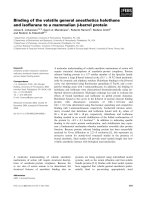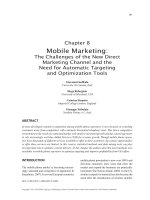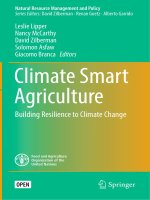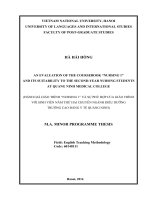Teachers’ perceptions of the new english 3 textbook and their suggestions to enhance teaching effectiveness
Bạn đang xem bản rút gọn của tài liệu. Xem và tải ngay bản đầy đủ của tài liệu tại đây (1.36 MB, 102 trang )
MINISTRY OF EDUCATION AND TRAINING
QUY NHON UNIVERSITY
NGUYEN THI THUY TRANG
TEACHERS’ PERCEPTIONS OF
THE NEW ENGLISH 3 TEXTBOOK
AND THEIR SUGGESTIONS TO
ENHANCE TEACHING EFFECTIVENESS
Major: Theory and Methodology of English Language Teaching
Code: 8140111
Supervisor: Assoc. Prof. Dr. Nguyen Thi Thu Hien
BỘ GIÁO DỤC VÀ ĐÀO TẠO
TRƯỜNG ĐẠI HỌC QUY NHƠN
NGUYỄN THỊ THUỲ TRANG
NHẬN THỨC CỦA GIÁO VIÊN VỀ
SÁCH TIẾNG ANH 3 MỚI VÀ NHỮNG ĐỀ XUẤT CỦA
HỌ ĐỂ NÂNG CAO HIỆU QUẢ GIẢNG DẠY
Ngành: Lý luận và phương pháp dạy học bộ môn tiếng Anh
Mã số: 8140111
Người hướng dẫn: PGS. TS. Nguyễn Thị Thu Hiền
i
DECLARATION OF AUTHORSHIP
The thesis entitled “Teachers’ perceptions of the new English 3
Textbook and their suggestions to enhance teaching effectiveness” is
conducted under the supervison of Assoc. Prof. Dr. Nguyen Thi Thu Hien.
I declare that the ìnformation reported in this study is the result of my
own work and effort, except where due reference is made. This thesis has not
been submitted for the award of any degree or diploma in any university.
Quy Nhon, 2023
Nguyen Thi Thuy Trang
ii
ACKNOWLEDGEMENTS
Without the support, encouragement, and contributions from my
supervisor, my professors, my school, my colleagues, my friends, and my
family, the successful completion of this thesis work would not have been
possible. I take this chance to express my deepest thanks to them for their
support.
First and foremost, I would like to express my deepest gratitude to my
thesis advisor Associate Prof. Dr. Nguyen Thi Thu Hien for her continuous
support, expert guidance, and patience throughout the study. She provided me
with assistance at every stage of the process and always expressed her faith in
me. I am gratefully indebted to her for her valuable comments on this thesis.
A special thank goes to Dao Duy Tu Primary School for giving me the
chance to attend a MA course at Quy Nhon University.
This study was made achievable by the participation of the enthusiastic
teachers and students at Primary Schools in Phu Yen Province, who devoted
their time to taking part in this research.
I am also thankful to my colleagues for their support during my study
time. I am also grateful to Quy Nhon University, Department of Graduate
Education, Faculty of Foreign Languages, and Faculty of Education for the
administrative assistance.
Last but not least, I want to express my gratitude to my family for
providing me with unfailing support and continuous encouragement
throughout the course and the study of this thesis.
iii
ABSTRACT
This study explored the teachers’ perceptions of the new English 3
Textbook and their suggestions to enhance teaching effectiveness. The new
English 3 textbook, published by Viet Nam Education Publishing House
Limited Company, is compiled to follow the General Education Program in
English 2018 of the Ministry of Education and Training. The study was
conducted with 25 teachers from 10 primary schools in Phu Yen Province
during March 2023. This research implemented the quantitative and
qualitative approaches in collecting the data, by using questionnaire and semi-
structure interview. The questionnaire was distributed to 25 teachers of
English; and the interview was completed with 7 teachers who returned the
questionnaires. The findings showed that the teachers had positive perceptions
of the content, skills, and activities designed in the textbook. Moreover, the
research found that teachers had differrent perceptions of difficulty level and
unit organization; the activities; and the skills and sub-skills distributions in
the English 3 textbook. The results also showed that teachers had different
perceptions of the challenges and the advantages when they using the new
English 3 textbook. Consequently, they offered some suggestions for better
teaching situations, such as differentiating instruction, using a variety of
teaching methods, providing opportunities for practice, using technology to
enhance learning, and partnering with parents and the community.
Keywords: Textbook, teachers’ perceptions, challenges and
advantages, suggestions.
iv
TABLE OF CONTENTS
DECLARATION OF AUTHORSHIP i
ACKNOWLEDGEMENTS ii
ABSTRACT iii
TABLE OF CONTENTSiv
LIST OF ABBREVIATIONS vii
LIST OF TABLESviii
CHAPTER 1. INTRODUCTION 1
1.1. RATIONALE 1
1.2. AIMS AND OBJECTIVES 2
1.2.1. Aims 2
1.2.2. Objectives 2
1.3. RESEARCH QUESTIONS 3
1.4. SCOPE OF THE STUDY 3
1.5. SIGNIFICANCE OF THE STUDY 3
1.6. ORGANIZATION OF THE STUDY 4
CHAPTER 2. LITERATURE REVIEW 5
2.1. A GENERAL DESCRIPTION OF TEACHING ENGLISH AS A
FOREIGN LANGUAGE IN VIETNAM 5
2.2. TEXTBOOKS 10
2.2.1. Definition of textbook 10
2.2.2. The role of textbooks for EFL teachers and students 11
2.2.3. A description of the new English 3 textbook 11
2.3. PERCEPTION AND ITS IMPORTANCE IN TEACHING
PROCESS 13
2.3.1. Definition of perception 13
2.3.2. The importance of perception on teaching 14
2.4. THE IMPORTANCE OF EVALUATION OF TEXTBOOKS 14
v
2.4.1. The evaluation of the content of ELT textbooks 17
2.4.2. The evaluation of the skills of ELT textbooks 19
2.4.3. The evaluation of the activities of ELT textbooks 19
2.4.4. 2.4.4. The evaluation of the language aspects of ELT textbooks
20
2.4.5. The evaluation of the culture of ELT textbooks 22
2.5. REVIEW OF RELATED EMPIRICAL STUDIES 23
CHAPTER 3. RESEARCH METHODOLOGY 26
3.1. RESEARCH DESIGN 26
3.2. SETTING AND PARTICPANT SELECTION 26
3.3. RESEARCH INSTRUMENTS 28
3.3.1. Questionaire 28
3.3.2. Semi – Structured Interview 31
3.4. DATA COLLECTION 32
3.5. DATA ANALYSIS 33
3.6. RELIABILITY AND VALIDITY 34
3.6.1. Reliability 34
3.6.2. Validity 35
CHAPTER 4. FINDING AND DISCUSSIONS 36
4.1. TEACHERS’ PERCEPTIONS ON THE NEW ENGLISH 3
TEXTBOOK 36
4.1.1. Teachers’ perceptions on the content of the new English 3
textbooks 36
4.1.2. Teachers’ perceptions on the activities of the new English 3
textbook. 42
4.1.3. Teachers’ perceptions on the skills of the new English 3
textbook 46
4.2. EFL TEACHERS’ PERCEPTIONS OF THE ADVANTAGES
AND THE CHALLENGES OF USING THE NEW ENGLISH 3
TEXTBOOK AND THEIR SUGGESTIONS TO ENHANCE TEACHING
vi
EFFECTIVENESS 50
CHAPTER 5. CONCLUSION AND IMPLCATION 59
5.1. Summary of the study 59
5.2. Implications 60
5.3. Limitations 60
5.4. Suggestions for further research 61
REFERENCES 61
APPENDICES
vii
LIST OF ABBREVIATIONS
EFL: English as a Foreign Language
ESL: English as a Second Language
MOET: Ministry of Education and Training
viii
LIST OF TABLES
Table 2.1 The 10 English textbooks for Grade 3 .............................................. 8
Table 2.2. The English 3 textbook structure (MOET, 2018) .......................... 13
Table 3.1. The background of teacher participants ......................................... 28
Table 3.2. Process of conducting the Survey .................................................. 31
Table 3.3. Reliability Statistics of the questionnaire ...................................... 34
Table 4.1. Teachers’ perceptions on the content of the new English 3
textbooks ....................................................................................... 37
Table 4.2. Teachers’ perceptions on the activities of the new English 3
textbook ......................................................................................... 42
Table 4.3. Teachers’ perceptions on the skills of the new English 3
textbook ......................................................................................... 46
Table 4.4. Teachers’ perceptions on the advantages and the challenges of
the new English 3 textbook ........................................................... 50
1
CHAPTER 1. INTRODUCTION
1.1. RATIONALE
Textbooks play a crucial role in English language teaching and
learning. Teachers are the primary users of textbooks in the classroom, and
their perceptions of the textbook can have a significant impact on how they
use it and the effectiveness of their teaching. Textbooks are the most widely
used teaching materials in the world. According to a 2020 survey by the
International Association of Publishers (2020), 98% of teachers in developing
countries and 93% of teachers in developed countries use textbooks in their
teaching. Teachers' perceptions of textbooks can have a significant impact on
how they use them and the effectiveness of their teaching. A study by Brown
(2000) found that teachers who have a positive perception of a textbook are
more likely to use it effectively in their teaching.
There are a few studies that have investigated teachers' perceptions of
English textbooks in ESL/EFL classrooms, such as, Richards and Mahoney
(1996); Nurhayati (2013); Dinh and Le (2020); Nguyen and Nguyen (2007),
Septiana et al. (2020). These studies found that teachers generally have a
positive perception of English textbooks, but they also have some suggestions
for improvement.
The new English 3 Textbook is a significant change from the previous
textbook. It has a new curriculum, new teaching approaches, and new materials. It
is important to understand how teachers perceive this change and how it is
impacting their teaching. By understanding teachers' perceptions of the new
English 3 Textbook and their suggestions to enhance teaching effectiveness, we
can identify areas where the textbook can be improved and develop strategies to
help teachers use the textbook more effectively. Moreover, we can improve the
quality of English language teaching and learning for all students.
2
The new English 3 Textbook has been recognized as the official
English textbook starting from the 2022-2023 school year by the National
Assessment Council under Decision No. 438/QĐ-BGDĐT signed by the
Minister of Education and Training on January 28, 2022. It is applied to all
provinces and cities in the country. In Phu Yen Province, all primary schools
have chosen this textbook series for teaching. However, since it has only been
applied for one school year, there has been no research on the perceptions of
teachers and students about the content, the language skills and the
advantages and disadvantages of using this new textbook series.
For that reason, I choose this study with the aim at understanding
how teachers perceive on the new English 3 textbooks so that there will be
some contributions in improving textbook and enhancing effective teaching.
1.2. AIMS AND OBJECTIVES
1.2.1. Aims
The aim of this research is to find out what teachers think about the
content, activities and skills of the new English 3 Global Success textbook
published by Viet Nam Education Publishing House Limited Company.
Besides, the research is to discover teachers’ possible challenges and the
advantages of using the new English 3 textbook and their suggestions to
enhance teaching effectiveness.
1.2.2. Objectives
There are two objectives which are focused on this study:
Identify the EFL teachers’ perceptions of the content, activities and
skills designed in the new English 3 textbook.
Explore the EFL teachers’ possible challenges and advantages of
using the new English 3 textbook and their suggestions for better teaching
situations.
3
1.3. RESEARCH QUESTIONS
The main research question that the study aims to investigate and
answer are: The following research questions are proposed in order to
investigate the perceptions of the teachers of the new English 3 textbook:
1. What are the EFL teachers’ perceptions of the content, activities, and
skills designed in the new English 3 textbook?
2. What are EFL teachers’ perceptions of the challenges and advantages
of using the new English 3 textbook and their suggestions to enhance teaching
effectiveness?
1.4. SCOPE OF THE STUDY
There are many aspects for evaluation a textbook. However, on account
of limited time, ability and research conditions, the researcher would like to
study the perceptions of the teachers on the content (appearance, format, and
language), activities, and skills (language skills and sub-skills) of the new
English 3 textbook; their perceptions of the challenges and advantages of
using the new English 3 textbook and their suggestions to enhance effective
teaching. The researcher was aware that the more participants joined in a
study, the more reliable the study was, but because the number of the English
teachers at Primary schools is very limited ranging from 1 to 3 teachers in
each school, only 25 teachers who are teaching in some primary schools in
Phu Yen province became the participants of the study.
1.5. SIGNIFICANCE OF THE STUDY
This study is assumed to find out ways in which teachers perceived the
new textbook like appropriate or inappropriate sources for teaching English at
some primary schools in Phu Yen Province.
This study could be used to develop professional programs helping
teachers use the new English 3 textbook more effectively. It could also be
4
used to improve the textbooks itself and to inform policy-makers and
curriculum developers about the needs of teachers. Besides, it could help to
improve the quality of English language education at primary school overall.
1.6. ORGANIZATION OF THE STUDY
The study consists of five chapters.
Chapter 1 “Introduction”, presents the rationale, aims and objectives,
research questions, the scope of the study, the significance of the study, and
the organization of the study.
Chapter 2 “Literature Review”, briefly reviews the literature of
previous studies on teacher’s perceptions on the English textbooks related to
this study. This chapter also provides the theoretical background textbook
evaluation of the content, activities, skills, and the roles of the textbooks.
Chapter 3 “Research Methodology”, deals with the research
methods, the description of the data, data analysis and research procedures,
The reliability and validity of the data are also presented in this chapter.
Chapter 4 “Findings and Discussions”, focuses on describing,
analysing and discussing the perceptions of the teachers of the new English 3
textbooks and their suggestions to enhance effective teaching.
Chapter 5 “Conclusion and Implications”, reveals a summary of the
results of the study. It also offers implications for making the effective ways
to implement these books and mentions the limitations of the study and the
suggestions for further research.
5
CHAPTER 2. LITERATURE REVIEW
This chapter presents a review of the relevant literature and research
that forms the background of the teacher’s perceptions of the textbooks.
Firstly, I will describe the current teaching English and the changing of the
content of English textbooks in Viet Nam. Secondly, the significance of
perception in teaching will be stated. Then, I will specify the roles of
textbooks in an EFL classroom. Next, I will give a background evaluation of
the textbooks. Finally, an overview of previous studies that involved teacher’s
perceptions of the English textbooks will be given.
2.1. A GENERAL DESCRIPTION OF TEACHING ENGLISH AS
A FOREIGN LANGUAGE IN VIETNAM
Learning English as a foreign language (EFL) is very popular in
Vietnam. English is seen as a gateway to better education, employment
opportunities, and international communication. As a result, the Vietnamese
government has placed a strong emphasis on English education in recent
years. English has been adopted as a major foreign language in Vietnam;
Nguyen & Nguyen (2007) believed that English helps boost employment
chances among Vietnamese youth both locally and internationally. This is
why the Vietnamese government issued Decision No. 1400/QD-TTg in 2008,
approving and operating the National Project - Foreign Language 2020, with
the general goal of renovating foreign language teaching and learning at all
school levels in the Vietnamese national education system during the period
2008 - 2020. The National Project - Foreign Language 2020 has had a
significant impact on English education in Vietnam. The project has led to the
development of new English language curricula and textbooks, as well as the
training of new English language teachers.
As Nguyen and Nguyen (2007) claimed, before 2013, there was no
6
consensus about official English textbooks across the country, and each
school used different teaching materials. The three main sets of English
textbooks that were used up to this point in primary schools were:
1. Books published by the American Book Company (e.g., Teaching
English in Primary School [Books 1, 2, 3] written by Pham Dang Binh and
Nguyen Quoc Tuan, Let’s Learn English [Books 1, 2, 3] written by Nguyen
Quoc Tuan, Phan Ha, Dao Ngoc Loc, and Do Thi Ngoc Hien)
2. Books published by the Centre for Educational Technology (e.g.,
English 1–5 written by Ngo Thi Tuyen)
3. Books published by Oxford University Press (e.g., Let’s Go, Family
and Friends)
The lack of a standardized English language curriculum and textbooks
created a number of challenges for both students and teachers. Students often
had to transfer to new schools, and teachers had to adapt to new teaching
materials. This made it difficult for students to maintain a consistent level of
learning.
However, since then, the Vietnamese government has taken steps to
address this issue by introducing a national curriculum for English language
teaching. The curriculum is designed to ensure that students receive a
consistent and high-quality education in English, regardless of their location
or socioeconomic background. The Vietnamese Ministry of Education and
Training (MOET) introduced domestically produced primary English
textbooks in 2013 in the hope of providing better English textbooks that are
more suitable for Vietnamese children. One of the principles of language
teaching, according to Tomlinson (2010), is to keep the teaching content and
teaching methodology consistent with the objectives of the program. This
means that the activities and materials that teachers use should be aligned
7
with the goals that they are trying to achieve with their students. The approach
of keeping the teaching content and teaching methodology consistent with the
objectives of the program is consistent with Hymes' (1972) proposal that to
develop communicative competence, learners need to learn more than just the
grammar, vocabulary, and pronunciation of the language. They also need to
learn about the culture of the language and how to use the language in
different social contexts.
The new English 3 textbook is based on the pilot English curriculum
for primary schools issued by the Ministry of Education and Training in
accordance with Decision No. 3321/QĐ-BGDĐT dated August 12, 2010. The
series was compiled and published by the Vietnam Education Publishing
House. The book is compiled in a communicative approach, helping students
to initially form and develop English communication skills through the four
skills of listening, speaking, reading, and writing, with a focus on the two
skills of listening and speaking. (MOET, 2010)
According to MOET (2010), the English textbook for Grade 3 is
divided into three levels for Vietnamese primary school students learning
English as a foreign language (EFL). The book is compiled systematically and
by topic, approved by the Ministry of Education and Training in August 2010,
aiming to develop all skills comprehensively, but with a particular focus on
listening and speaking in the early stages.
Until 2018, the Vietnamese Ministry of Education and Training
(MOET) issued the latest curriculum for English language education in public
schools in accordance with Circular No. 32/2018/TT-BGDĐT dated
December 26, 2018. Accordingly, 10 English textbooks for Grade 3 from four
publishers, including the Vietnam Education Publishing House, the National
University of Education Publishing House, the Ho Chi Minh City University
of Education Publishing House, and the Ho Chi Minh City National
8
University Publishing House, were approved. The 10 English textbooks for
Grade 3 are specified in the Table 2.1 below:
Table 2.1 The 10 English textbooks for Grade 3
Title Author Publisher
Global Success Hoang Van Van (General Vietnam Education
English 3 Editor), Phan Ha (Editor-in- Publishing House
Chief), Nguyen Thi Hai Ha, Do
Family and Thi Ngoc Hien, Dao Ngoc Loc, Vietnam Education
Friends - National Tran Huong Quynh, Nguyen Publishing House
Edition 3 Quoc Tuan
English Discovery Tran Cao Boi Ngoc (Editor-in- National University
3 Chief), Truong Van Anh of Education
Macmillan Next Publishing House
Move 3 Tran Thi Lan Anh (Editor-in- Ho Chi Minh City
Chief), Cao Thuy Hong University of
Explore our world Education
3 Hoang Tang Duc (Editor-in- Publishing House
Chief), Nguyen Thi Thu Hoai, Ho Chi Minh City
i-Learn Smart Hoang Thuy Huong University of
World 3 Education
Dao Xuan Phuong Trang Publishing House
Phonics- Smart 3 (Editor-in-Chief), Nguyen Ho Chi Minh City
Thanh Binh, Do Thi Kim Thanh University of
Education
Vo Dai Phuc (General Editor Publishing House
and Editor-in-Chief), Nguyen
Thi Ngoc Quyen, Dang Do Ho Chi Minh City
Thien Thanh, Le Thi Tuyet National University
Minh, Huynh Tuyet Mai, Publishing House
Nguyen Thuy Uyen Sa
Le Hoang Dung (Editor-in-
Chief), Quan Le Duy
9
Title Author Publisher
Extra and Friends Vo Dai Phuc (General Editor Ho Chi Minh City
3 and Editor-in-Chief), Nguyen University of
Thi Ngoc Quyen Education
Publishing House
Guess What! 3 Can Thi Trang Duyen (Editor- National University
in-Chief), Nguyen Thi Dieu Ha, of Education
Nguyen Thuy Lan Publishing House
Wonderful World Nguyen Thu Le Hang (Editor- National University
3 in-Chief), Nguyen Mai Phuong, of Education
Pham Thanh Thuy, Tran Hoang Publishing House
Anh, Tran Thi Anh Thu
The Global Success English textbooks for Grade 3 are based on the
Vietnamese national curriculum for English (issued in conjunction with
Circular No. 32/2018/TT-BGDĐT dated December 26, 2018 by the Minister
of Education and Training) and the Vietnamese National Foreign Language 6-
Level Framework of the Ministry of Education and Training. The series was
compiled by Professor Dr. Hoang Van Van as the general editor and was
developed in close cooperation between the Vietnam Education Publishing
House and the world-renowned publisher Macmillan Education. The new
English 3 textbook has been recognized by the National Assessment Council
as the official English textbook starting from the 2022-2023 school year under
Decision No. 438/QĐ-BGDĐT signed by the Minister of Education and
Training on January 28, 2022.
Based on MOET (2018), English language curriculum for grade 3 is
complied with the provisions in the general education curriculum of the
Ministry of Education and Training regarding the duration of teaching the
subject. Specifically, at primary level, there are 4 periods per week for each
grade 3, 4, and 5; that means there are 140 periods each grade, making the
total of 420 periods.
10
2.2. TEXTBOOKS
2.2.1. Definition of textbook
According to the Oxford Advanced Learner’s Dictionary, a textbook is
defined as “a book that teaches a particular subject and that is used especially
in schools and colleges. It is also defined as a book used by students as a
standard work for a particular branch of study. A textbook contains
comprehensive information about a course or a subject that a student needs to
get through the academic year”. (McGrath 2002, O’Neil 1982, Ur 1996). It is
obvious that schools with regular classes need textbook as a guiding resource
to study. (Tomlimson, 2008). Actually, the existence of textbook is a demand
from institutions and schools. (Hutchinson & Torres 1994). They consider that
the textbook provides an outline and syllabus for students and teachers in the
process of teaching and learning. Ansary and Babaii (2002) argue that in
many situations, a textbook can serve as a syllabus and it is ready-made
teaching texts and learning tasks.
A textbook is a course book that contains knowledge of a certain lesson
and is used as a primary teaching tool in schools and universities. (O’Neil
1982, Ur 1996). Textbook plays an essential rule in educational process.
Textbook is planned to be a source book for the students to seek any
important information in order to create competent students. Thus, the
textbooks used in the school have to be programmed following the
appropriate materials based on the structure of education.
Graves (2000: 175) defines the textbook as “a standard source of
information for the formal study of a subject and an instrument for teaching
and learning”. The teachers could use the materials from the textbook for the
whole semester. Textbooks served different purposes for the teachers. It works
as a source of supplementary material, an inspiration for classroom activities,
and as a curriculum itself. Textbooks also assist students’ activities such as in









